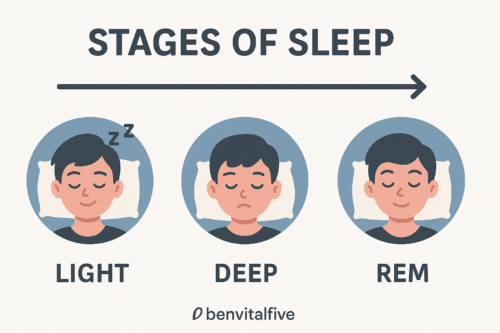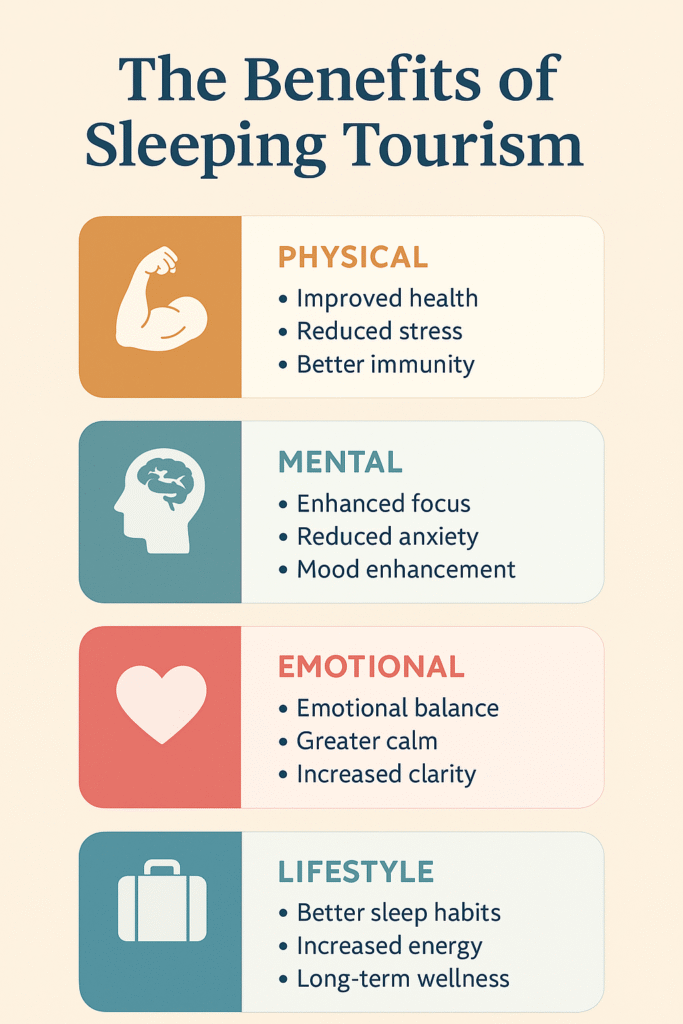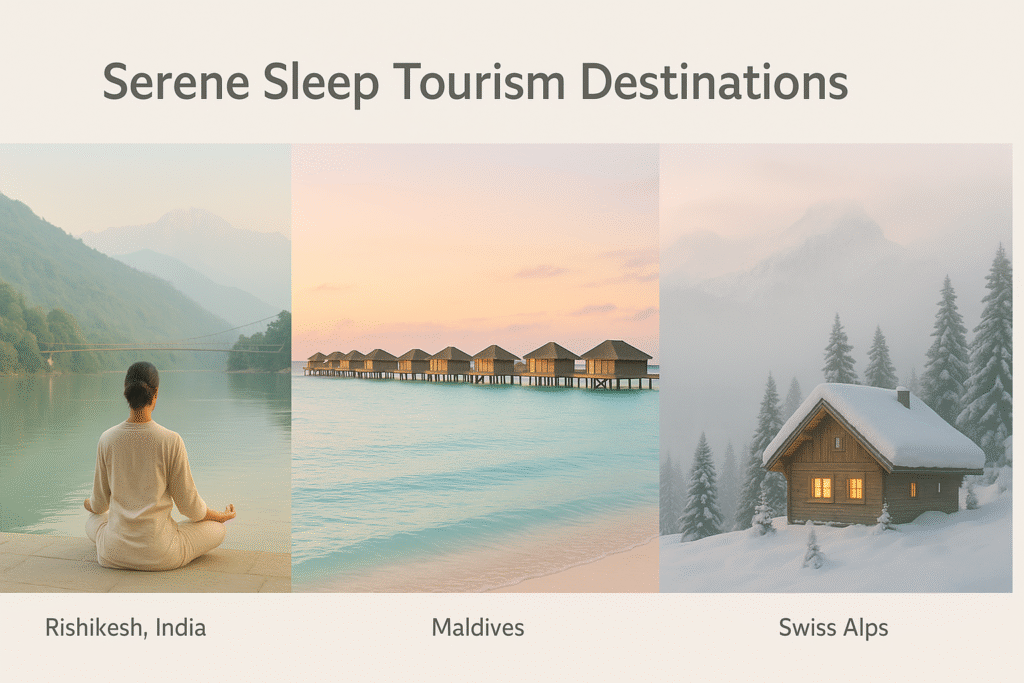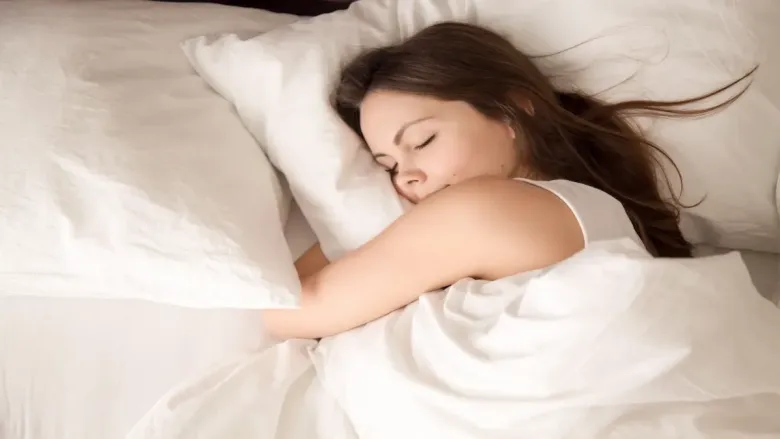Table of Contents
Toggle1. Introduction
Sleeping tourism is becoming increasingly popular across the world, especially after COVID-19. On the occasion of World Sleep Day 2025, a study conducted by Local Circles examined sleep patterns and challenges faced by people in India.
The research revealed some striking findings:
- 59% of respondents said they sleep peacefully for only 6 hours a day.
- 38% reported having less than 6 hours of undisturbed sleep.
- An alarming 93% admitted to experiencing sleep deficit.
Sleep and relaxation are basic requirements for healthy living. Yet, many working-class individuals sacrifice their sleeping hours to meet family and financial demands.
Traditionally, travel was about adventure, sightseeing, and activity. But today, a new trend is on the rise—sleeping tourism. In this form of travel, the primary goal is restful sleep. In a world filled with deadlines, digital distractions, and constant stress, sleep has truly become a luxury. Supporting this, the Philips Global Sleep Survey (2020) found that 62% of adults worldwide experience poor sleep at least once a week. Sleeping tourism provides an effective solution to this modern problem.
Here’s a clear, reader-friendly section you can add under “The Science of Sleep” in your blog post:
What Is Sleeping Tourism?
Sleeping tourism is a new form of travel designed to help people sleep better and live healthier. It combines wellness, science, and relaxation to create a travel experience centered around deep, restorative sleep.
Unlike a typical vacation that may leave you tired, sleep tourism helps you return home rejuvenated.
Common features include:
- Rooms with blackout curtains and soundproofing
- Custom bedding, pillows, and temperature control
- Aromatherapy and herbal teas to promote sleep
- Sleep coaching and guided meditation
- Circadian lighting systems that align with your body’s rhythm
- Digital detox programs to minimize screen exposure
It’s a travel experience that invites you to pause, breathe, and rest deeply.
The Science of Sleep
Sleep is not just rest—it is an active process where the body and mind repair, recharge, and reset. Scientists divide sleep into two main types:

- Non-REM Sleep (NREM): The body goes through three stages, from light sleep to deep sleep. In this phase, tissues repair, energy is restored, and the immune system strengthens.
- REM Sleep (Rapid Eye Movement): This is the dream stage. It is crucial for learning, memory, and emotional regulation
A healthy sleep cycle moves through these stages several times each night, lasting about 90 minutes per cycle.
Research shows:
- During deep NREM sleep, the brain clears toxic waste products that build up while we are awake (Nedergaard, Science Translational Medicine, 2013).
- REM sleep supports creativity and problem-solving, making it vital for mental clarity.
- Lack of both NREM and REM sleep is linked to higher risks of obesity, heart disease, diabetes, and depression (Harvard Medical School, 2019).
In short, sleep is a biological necessity, not a luxury. It balances physical health, brain function, and emotional wellbeing. This is why sleep tourism, with its focus on structured rest, has become so appealing for modern travelers.
2. What is Sleeping Tourism?
Sleeping tourism, also called sleep tourism, is travel designed to help people sleep better. Resorts, wellness hotels, and retreats provide experiences focused on deep rest. Think of sleep-friendly rooms with blackout curtains, soundproofing, calming teas, and guided meditation before bed. Some even offer “sleep concierges”—professionals who customize your stay for optimal rest. Unlike a normal vacation, where people often come back more tired, sleeping tourism is about leaving refreshed and renewed.
3. Why Sleeping Tourism Is Growing
The rise in sleep tourism is part of a larger wellness revolution. The Global Wellness Institute (2023) estimates that wellness tourism is worth $900 billion globally, and sleep-focused travel is one of its fastest-growing niches.
Here’s why:
- Post-pandemic stress: People crave relaxation and emotional recovery.
- Burnout culture: Overworking and digital overload have increased insomnia.
- Holistic wellness awareness: Travelers now seek experiences that improve mental and physical wellbeing.
- Innovative hotels: Global brands like Six Senses and Park Hyatt now offer specialized “sleep programs.”
- Science-backed solutions: More people understand that sleep directly affects longevity and happiness.
4. The Rise of Sleeping Tourism
Wellness travel is booming. According to the Global Wellness Institute, the wellness tourism industry is worth over $900 billion (2023). Within this, sleep-focused travel is rapidly growing. Luxury hotels now offer sleep programs. Examples:
- Park Hyatt New York has “Sleep Suites” with AI-powered beds that adjust to your body.
- Six Senses Resorts include sleep tracking, yoga nidra, and nutrition plans.
- Switzerland’s sleep hotels provide alpine air, silence, and sleep therapy.
This shows people are willing to travel just to sleep better.
5. Key Benefits of Sleeping Tourism
A well-planned sleep-focused vacation offers multiple dimensions of healing.

5.1 Physical Health Benefits
A restful sleep holiday can reset your body. Deep sleep lowers stress hormones like cortisol. It regulates blood pressure and supports heart health. Recovery is faster, especially for those suffering from burnout or jet lag.
- Lowers blood pressure and stress hormones
- Boosts immunity and cell repair
- Improves digestion and metabolism
- Helps restore hormonal balance
- Scientific note: Regular deep sleep promotes the release of growth hormone, essential for tissue repair and muscle recovery.
Read: Overcoming Challenges and Staying Motivated in Wellness
5.2 Mental Health Benefits
- Reduces anxiety and depression
- Enhances focus, creativity, and memory
- Balances mood swings
- Increases mindfulness and clarity
Supporting research: People with chronic insomnia are 5 times more likely to develop depression (Harvard Medical School, 2015). Sleep retreats often include mindfulness meditation, which has been proven to reduce stress and improve mood.
Good sleep reduces anxiety and depression symptoms. A Harvard study on Harvard Health – Sleep and Mental Health shows that people with insomnia are five times more likely to develop depression (Harvard Medical School, 2015). Sleep tourism, with guided relaxation, meditation, and therapy, provides mental peace
Link “mental clarity” → Super Brain Yoga
5.3 Emotional & Spiritual Benefits
Sleep restores emotional balance. When you rest well, you feel calmer and more present. Many retreats combine sleep with mindfulness practices, helping travelers reconnect with themselves.
- Provides emotional reset and calmness
- Encourages self-reflection and inner peace
- Restores balance between mind and body
- Promotes gratitude and emotional healing
Spiritual rest helps you reconnect with your purpose and realign your inner energy.
5.4 Lifestyle & Productivity Benefits
- Resets your sleep routine
- Improves concentration and motivation
- Builds long-term wellness habits
- Enhances work performance and creativity
- People who return from sleep retreats often describe feeling “mentally lighter and physically stronger.”
A sleep retreat can re-train your sleep routine. By disconnecting from screens and stress, you create healthier habits. Better sleep means sharper focus at work and more energy for personal life.
Link “healthy lifestyle” → [Morning Nutrition, Healthy Living, Weight Loss]
6. Popular Sleeping Tourism Destinations

India
- Rishikesh & Coorg: Yoga, meditation, and nature-based retreats.
- Kodaikanal & Munnar: Peaceful hill stations perfect for sleep recovery.
International
Switzerland: Sleep therapy hotels in the Alps.
Maldives: Ocean-view sleep pods and floating villas.
Japan: Minimalist capsule hotels designed for deep rest.
Thailand: Forest resorts combining Thai massage with sleep therapy
These destinations turn sleep into an experience, not just a necessity.
7. How to Choose the Right Sleep Tourism Experience
When planning your restful getaway, consider:
Location: Choose quiet, natural settings far from city noise.
Sleep programs: Look for retreats with meditation, yoga, and circadian lighting.
Amenities: Opt for noise-free rooms, organic mattresses, and herbal wellness treatments.
Duration: Spend at least 3–5 nights for true rejuvenation.
Budget: From luxury resorts to affordable eco-retreats, choose what fits your needs.
8. Sleeping Tourism vs. Traditional Vacations
| Feature | Traditional Vacation | Sleeping Tourism |
| Focus | Sightseeing & activity | Rest & rejuvenation |
| Energy Level | Often exhausting | Deeply restorative |
| Result | Fun memories, fatigue | Calm mind, renewed body |
| Ideal for | Families, adventure seekers | Wellness travelers, professionals |
You can even combine both—first explore, then rest deeply for a few days.
9.. Who Can Benefit the Most?
Sleeping tourism is for everyone. But some groups benefit more:
- Busy professionals: Escape stress and recharge.
- People with insomnia or jet lag: Structured programs for recovery.
- Seniors: Improve sleep quality linked to aging.
- Wellness seekers: Combine rest with yoga, meditation, and nutrition.
10. How Sleeping Tourism Connects with the Benvitalfive Philosophy
At Benvitalfive, we believe wellness is not a trend—it’s a lifestyle. Our motto, “Live Long & Live Quietly,” aligns perfectly with the essence of sleeping tourism.
Just as walking with nature or practicing mindful yoga nurtures health, restful sleep completes the circle of wellbeing.
Sleeping tourism promotes the five vital pillars of Benvitalfive:
Mindful Rest
Healthy Nutrition
Movement & Balance
Mental Calmness
Connection with Nature
It’s not just travel—it’s self-renewal.
11. Final Thoughts
Sleeping tourism is more than a trend. It is a wellness investment. Science proves that sleep strengthens health, immunity, and happiness. A holiday that gives you back your sleep gives you back your life.
Next time you plan a trip, ask yourself: do I need adventure—or do I need rest? If it’s rest, sleeping tourism may be the journey your body and mind are waiting for.



